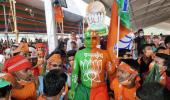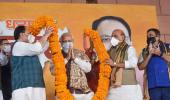This is something that Modi's critics are reluctant to accept: He is the most popular leader that India has seen since Indira Gandhi, says Vir Sanghvi.

Sometimes we focus too much on the obvious and miss the subtler messages that election results send out.
We know, for instance, that Joe Biden won the US presidential election and that he is expected to guide America back to rejoin the rest of the civilised world.
But we ignore, at our peril, another significant feature of the election: Over 71 million people voted for Donald Trump, a full eight million more than in 2016.
In India too we focus on the obvious: The closeness of the Bihar race, the collapse of Nitish Kumar's popularity and the rise of Tejashwi Yadav as a mass leader.
But we pay less attention to the real message of the election: The final confirmation that Narendra Modi is not only the most popular politician in India but that his popularity which, so far, had only guaranteed the Bharatiya Janata Party victories at parliamentary elections has now grown to encompass state elections.
In Bihar, the prime minister's personal popularity helped the BJP (which was a part of the state government) escape the anti-incumbency backlash that so hurt Mr Kumar.
Not only did Mr Modi's popularity help the BJP in Bihar, but in bypolls held all over India, the party swept to victory, easily defeating its opponents.
With the exception of the Chambal area of Madhya Pradesh where Jyotiraditya Scindia must get the credit, the victory is Modi's.
The BJP won 40 out of 58 contests in 11 states; a massive success by any standards. These states were spread out all over the country, the local issues were entirely different and the candidates were varied. Only one factor united the BJP victory: The prime minister's own image and charisma.
Two months ago, I wrote that Modi's fans like him not for the things he does (or does not do), but for what he is and for what he represents.
Though there is no parallel between Trump and Modi (the president can be a rude, crude buffoon while the prime minister is one of the shrewdest politicians India has ever seen), there is a similarity in the way in which their critics are baffled by their popularity.
Americans, noting the massive size of Trump's vote share and the unexpectedly close nature of the presidential race, wondered how people could possibly vote for a man who wilfully mishandled the Covid pandemic, letting over 230,000 people die on his watch.
Did it not matter, they asked, that so many of Mr Trump's closest advisors and aides have ended up in jail? (Not during some hostile, vindictive regime but while Trump was still in the White House.) And so on.
The short answer is that for Trump supporters, it did not matter. They liked what he represented: A return to some mythical era of American greatness, when white was good and blacks knew their place; when the US could tell the rest of the world to go to hell and refuse to play by the accepted rules of foreign policy because, well, it was the United States and could do whatever it liked.
In India, Modi's critics raise questions about his performance. The economy was in trouble even before the pandemic hit. Relations with our neighbours are in worse shape than they have been for a while.
Over 21 million salaried jobs have been lost. And the suddenness of the lockdown caused untold hardship to 10 million migrant workers who made the painful trek home.
In terms of Covid numbers, we are second only to the United States on many parameters.
But, when it comes to the crunch, none of this matters. Modi's popularity is performance-proof. Voters approve of his vision of a Ram Rajya, built on so-called Hindu values where India is largely corruption-free and respected throughout the world.
It is instructive that in Bihar, a state whose migrant labourers suffered the most, there was massive anger against Kumar for not helping his people but very little anger against Modi who, by ordering a sudden lockdown, actually set off the mass exodus.
Trump's critics say that his perceived achievements are bogus. And our prime minister's opponents say he takes credit for achievements that do not exist. (Is India really much more respected in the world under Modi than it was under Dr Manmohan Singh?)
But what matters is that Modi's supporters believe him just as the 71 million people who voted for Trump believe in the president's 'achievements'.
Some of this, no doubt, is down to a mastery of social media, an area where both the Modi and Trump camps easily outperform their opponents.
And the major difference between India and America is that while Mr Biden was able to provide an alternative to Trump, we have no national alternative here.
The Congress, which should have got its act together after six years in Opposition, is in worse shape than ever.
As far as other Opposition parties are concerned, the Congress has become like some tiresome elderly relative who crashes the party, drinks up all the booze and stays on to wreck the celebration.
At some stage, even the politest person tells the party-crasher to stay away. Opposition parties will say much the same thing to the Congress sooner or later.
What follows from all this is something that Modi's critics are reluctant to accept: He is the most popular leader that India has seen since Indira Gandhi.
And while Mrs Gandhi's popularity was based on solid achievements (the break-up of Pakistan, for instance), and faded when those achievements dried up, Modi has no reason to bother to deliver substantial achievements. His image and his popularity seem enough to carry him through.
We live now in the age of the mythological prime ministership. For many Indians, Modi has risen above politics to become some sage out of the epics. (These days he even looks the part.)
And when a prime minister reaches that level, most normal standards of performance or accountability cease to apply.
Vir Sanghvi is a journalist and TV presenter.











